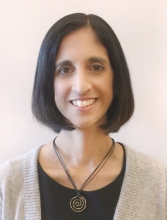BME Distinguished Lecturer (ZOOM): Tejal Desai, UC San Francisco

Desai Lab
Ernest L Prien Endowed Chair and Deborah Cowan Endowed Professor
Department of Bioengineering & Therapeutic Sciences, UC San Franciso
Professor in Residence, Department of Bioengineering, UC Berkeley
Therapeutic Biomaterials: Engineering Material "Structure" to Modulate Biologic Delivery
Abstract: The ability to deliver therapeutics within and across biologic barriers is a much sought-after goal. In this talk, I will discuss our recent work in developing nanostructured materials for biologic delivery as well as injectable micro/nanoscale materials for the modulation of fibrosis and immune activation. By incorporating micro and nanoscale features into biomaterials, one can modulate properties such as tissue permeability, matrix production and cell activation. The understanding of how small-scale topographies can influence the biological microenvironment allows us to design platforms for applications in therapeutic delivery and tissue regeneration. Micro and nanostructured materials can add functionality to current drug delivery platforms while becoming an enabling technology leading to new basic discoveries in the pharmaceutical and biological sciences.
Bio: Tejal Desai is the Ernest L Prien Endowed Chair and Deborah Cowan Endowed Professor of the Department of Bioengineering & Therapeutic Sciences, Schools of Pharmacy and Medicine at University of California, San Francisco (UCSF); and professor in residence, Department of Bioengineering, UC Berkeley (UCB). She serves as director of the NIH training grant for the Joint UCSF/UCB Graduate Program in Bioengineering, and founding director of the UCSF/UCB Master’s Program in Translational Medicine. She was recently named the Inaugural Director of the UCSF Engineering and Applied Sciences Initiative known as HIVE (Health Innovation Via Engineering). Desai’s research brings together advanced micro and nanotechnologies, fundamental insight into cellular behavior in engineered environments and novel pharmacologic delivery approaches to address disease treatment and clinical translation. Currently, her laboratory focuses on four highly interdisciplinary directions: 1. Hierarchical devices for enhanced cellular adhesion and paracellular drug transport; 2. Injectable and flexible nanoporous devices for rate-controlled long-term release of therapeutics; 3. Nanostructured coatings and scaffolds for pro-healing implants and in vivo modulation of fibrosis and 4. Cell-based delivery platforms for autoimmune disease applications. She envisions a future of precision medicine, enabled by advances in nanotechnology, engineering and cell biology directed to clinical challenges in disease treatment.
Share
Upcoming Events
-
MSE 298 Seminar: Quasi-1D/2D Charge-Density-Wave Materials - From Exotic Physics to Application Prospects
-
EECS Seminar: Steering Diffusion Models for Generative AI, From Multimodal Priors to Test-Time Scaling
-
MAE 298 SEMINAR: Hypersonic Viscous Aerothermochemistry - External Aerothermodynamics and Scramjet Fuel-Air Mixing
-
CBE 298 Seminar: Finding Catalysts of Gut Reactions - The Gut Microbiota in Disease Onset and Treatment
-
CEE Seminar: Confirming a Critical Foundation of Global Warming - Direct Observational Evidence from Space of the Impact of CO2 Growth on Infrared Spectra
